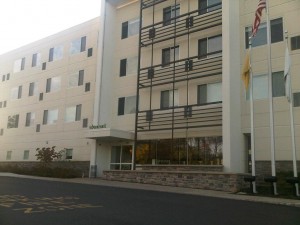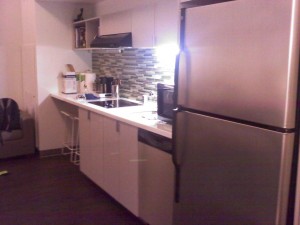Imagine a kitchen complete with a stove, coffeemaker, dishwasher and toaster; access to a gym not packed with students; a full bathroom with a waterfall showerhead; and weekly housekeeping services.
This is the residential reality for College students living in the Element by Westin hotel.
The Element is one of two hotels provided as alternatives to living on campus. With Cromwell Hall closed for renovations, there was an estimated shortage in bed spaces.
Through Residential Housing and Education, upperclassmen signed up to live in the Element by Westin and the Courtyard Marriott — both located in Ewing, approximately 10 minutes from campus.
According to Ryan Farnkopf, director of housing operations, there are around 100 students living in hotels this school year.
“Almost all of the available rooms were filled,” Farnkopf said in an email. “We have a couple open spaces that are being offered off our waitlist.”
Matt Luppino, junior biology major, chose the hotels because of the potential bed shortage and how hotel residents were selected on a first-come, first-serve basis.
“To make things easier and less stressful, it seemed like the best option,” said Luppino, who lives in the Element. “But lo and behold, everyone got housing, so it kind of worked out for everyone.”
Likewise, Rachael Voysey, who is a senior health and exercise science major, decided to live in the Element because she was not guaranteed housing. Junior graphic design major Mallory Guzzi also feared not getting housing.
Unlike the other three, senior cognitive science major Taylor Enoch lives in the Courtyard. Still, he made the decision for similar reasons.
“It was scary to be advised that upperclassmen ran the risk of not getting housing for this academic year,” Enoch said. “Also, the chance to live in a hotel for a year seemed to be a once-in-a-lifetime opportunity.”
In the Marriott, College students make up a majority of the top floor of the five-story building, while students in the Element take up the second floor.

“Being on the fifth floor, my view is gorgeous,” Enoch said. “The design and size of the rooms are luxurious as well, and I feel like I’m living in a home now, rather than in a dorm.”
Guzzi agreed about the aesthetics.
“The rooms are beautiful, and the bed is the most comfortable slice of heaven I’ve ever slept on,” she said. Some rooms in the Element have queen-sized beds, while others have standard TCNJ beds.
Students residing in the hotels can access hotel amenities. These include breakfast, pool/gym usage, air-conditioning and a flat-screen TV.
Luppino described the Element’s continental breakfast as having plenty to choose from. Options include hot sandwiches on half bagels or biscuits, and sometimes breakfast burritos. There is also yogurt, cereal and fruit.
Meanwhile, Enoch said the Courtyard doesn’t offer a continental breakfast, but provides coffee — however he prefers brewing his own.
Residents can use their hotel’s 24-hour fitness centers. Voysey enjoys not having to make reservations for a treadmill or deal with open swim hours.
Fitness freedom is not the only liberating aspect of hotel life.
According to Guzzi, “It is definitely nice being here and not having all the restrictions we have in on-campus housing. I feel like I’m not being baby-sat. We don’t need to check in guests and can just do our own thing.”
The buildings are staffed by the hotel and community advisors from the College.
All four students spoke highly of the personable hotel personnel. The desk staff is cheerful, as are the housekeepers.
Maid service is one of Luppino’s favorite perks. “I don’t mind cleaning, but it’s nice when someone does it for you,” Luppino said. One maid cleans the bathroom while another dusts and vacuums. They also take out the garbage or wash dishes.
For liability reasons, students must be present for cleanings. Though Guzzi enjoys the service, she finds the mandatory timeframe “a little bit inconvenient,” having to wait in the room for a four-hour period each week.
For transportation, a shuttle service runs from the two hotels to the bus stop outside the Brower Student Center.
Luppino described the shuttle as a good option. “It also makes me maximize how much use I get out of my gas,” he explained. He usually drives to campus once a day, but uses the shuttle if he has to go back and forth.
Guzzi uses the shuttle more frequently because it drops her off closer to class.
“We were told the shuttle would go from 7:30 a.m. to 2:30 a.m. every half hour, but the shuttle currently runs 7:30 a.m. to 9:45 p.m. about every 45 minutes, and only 10 a.m. to 8 p.m. on weekends, once an hour,” she said.

Voysey agreed that more frequent shuttles would be beneficial.
Though she likes the service, Voysey feels like she is “always waiting for it” and it does not coincide with class times. She has class at 10 a.m. but the shuttle gets to campus at 10 a.m., so she winds up late.
While Farnkopf said housing has received “largely positive feedback” from students residing in hotels, he acknowledged the importance of student feedback.
“I’m grateful to the few students who have reached out to express their interest in extending the shuttle hours, and we will keep their interests in mind when reviewing the schedule with our vendor,” he said.
Originally students were told they would use commuter parking (Lots 4 and 6) but were then moved to residential parking (Lots 8 and 9, behind the Towers and Cromwell Hall), according to Guzzi. This shift happened only two weeks prior to move-in.
“For me, the parking was a big part of agreeing to live in the hotel,” Guzzi said. She is an art student, who stays in the art building until all hours of the night and serves on the College Union Board’s Executive Board, and sometimes staffs late-night events.
“I now have to walk to the opposite side of campus by myself — a five-foot tall female — from 10 p.m. to 3 a.m.,” she continued. “This is something my parents are very uncomfortable with, and I probably wouldn’t have agreed to live there had I known that’s where they would be making me park.”
Enoch brought up similar points to Guzzi: “The worst part is the fact that we have to park in Lots 8 and 9,” he said. “This is what is most inconvenient to me, since it seems so far away from the hustle-and-bustle of campus.”
After calling the school multiple times regarding parking, Guzzi was eventually put in touch with a supervisor, who was helpful, but her phone calls have since gone unreturned. As it was explained to Guzzi, the parking location switched because the amount of students needing commuter parking was underestimated and hotel students have shuttle access.
Despite slight disadvantages, Voysey is happy with her decision to live in the hotels. “I really enjoy living in the hotel,” she said. “If I had the chance to do it again, I totally would.”
Guzzi sums up her experience on a partially positive note.
“I love my room, and the hotel is great, but we were promised a lot of things at the beginning that have now been taken away,” she said. “The entire process, all the way through move-in, was very stressful and unorganized.”
Meanwhile, Luppino has no regrets about residing in the hotels. When asked how he thinks it compares to previous residential experiences, he said, “I think it’s a lot better quite honestly.”
Likewise, Enoch said he’s ecstatic with the living arrangement and deemed it the best he’s had, after previously residing in Cromwell, Norsworthy and Hausdoerffer Halls.
“Whenever I talk about the hotel to anyone I say this: the pluses are big pluses, the ‘minuses’ are big minuses, but all in all, it’s an incredible experience,” Enoch said.
“I thank TCNJ for setting this situation up, and Marriott for cooperating,” he continued. “Each day I’m welcomed with a smile and a ‘welcome back home.’ And I have to say, I do feel welcomed and at home.”






